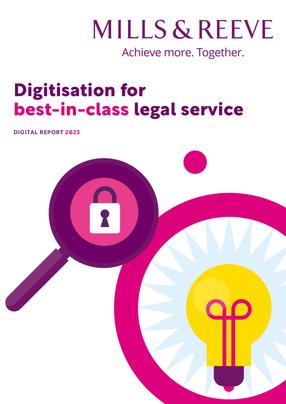Mills & Reeve: Digitisation for best-in-class legal service
In this digital era, technologies cut through complexity to simplify processes for teams that prioritise simplicity and ease of use. The transformation of firm-wide operations is no mean feat, but for a highly regulated environment such as the legal sector, the focus is on getting to the core of a problem with minimal barriers in place of information and operation.
When we think about order from a digital perspective, data storage and management scenarios can be overwhelming, even for in-house teams that are assigned the task of delivering smarter, more efficient solutions for ensuring that information is available, visible, and interpretable at any given time. After all, this is what individuals expect from a digital world, so the legal teams that support them must be able to keep up with that.
At the heart of Mills & Reeve’s success is an unwavering commitment to exceptional client experiences—a key trait of a high-performing law firm with more than 1,300 members of staff across the organisation. A seasoned professional in the field of IT and a long-term employee of Mills & Reeve, Dave Bradshaw, Head of Technology, emphasises the firm’s core values and mission statement, which have always revolved around the fundamental principle of putting the client first.
The firm’s people-centric approach is something that Bradshaw adopted very early in his career. Since the team has grown from a 200 employee-strong workforce when he joined in 1998, Bradshaw emphasises that the firm’s culture remains a key part of the way it operates.
Leaders drive the digital transformation journey
Bradshaw is well placed to share the details of the firm’s digital transformation over the years. Since the late 90s, their digital landscape has evolved and looks vastly different today. Access to the internet was limited at the time and the IT infrastructure in place could be described as ‘modest’ with just two offices and three servers in each. The definition of a ‘state-of-the-art’ system in the 90s would be a CD tower with space for 20 discs, which were primarily used for storing legal reference information.
Fast-forward to the present day and Mills & Reeve has embraced technology, as digital transformation has run its course to facilitate staggering changes within the organisation.
“The IT team has grown in both headcount and capability as technology and innovation are key values to the firm. We’re expected to be on the front foot of the next technological development and how we can use it to offer real value to the firm and our clients,” Bradshaw says.
“We implemented server virtualisation quite early in the 2000s. We were very much desk-based, but forward-thinking in terms of going open plan and paperless, which other law firms weren’t doing at the time.”
In 2013, Mills & Reeve’s Cambridge office moved to a larger premises in the UK, namely the imposing Botanic House building, where a radical change was introduced: the firm had fewer desks than employees, fostering a clear desk policy and hotdesking - unusual in an industry where personal offices were common. Later the firm implemented virtual desktop infrastructure (VDI) to enable employees to work remotely and access systems in a more flexible and secure manner. This also enabled a ‘Bring Your Own Device’ (BYOD) policy, which was “a huge enabler” that allowed employees to work from anywhere on any device securely.
But the transformation doesn’t stop here as Mills & Reeve follows a corporate trajectory of digitalisation. The approach it takes will see various IT functions outsourced, allowing the team to work on key projects more effectively and allowing more time to dedicate to critical in-house functions.
“In the last eight or nine years, there’s been a real big push to SaaS services where possible. Our strategy is to buy, not build and select best of breed products that integrate tightly with Microsoft 365. The Microsoft 365 suite is the foundation to the whole platform” says Bradshaw.
“We’ve just completed a huge document management system migration project. We’ve moved 90 million documents to the cloud, put in new enterprise search tools, and template management tools, and we’ve just launched a new intranet. These investments are key to our technology transformation.”
Clients drive the demand for digital transformation
A natural query to Bradshaw was that of client influence. As a client-centric business, providing the best possible experience for clients means responding to their particular needs in relation to cybersecurity, digital communications and other technologies they may have to adopt to work seamlessly with the law firm. As more data is exchanged between them, client data security is paramount and Mills & Reeve is responsible for ensuring its lines of interaction are safe.
Mills & Reeve recognises the symbiotic relationship between client needs and technological advancements. In their pursuit of legal services, a growing number of clients naturally drive the firm to digitise its ways of working. Not only is this dynamic interaction crucial for business, but it breeds innovation and provides a focus for digital transformation.
“The biggest discussion we've had with our clients that's impacted, and maybe changed our strategy slightly, is around IT security. There’s an ever increasing list of very stringent security requirements that our clients demand,” says Bradshaw.
“Every time we bid for work, there seem to be new security requirements to adhere to. There's been a number of times we've had to add to our security portfolio or adjust an internal policy. We were already on that security journey anyway, but projects are either shifting in priority or we’re dropping certain initiatives and adding in functionality or policy elsewhere.”
Mills & Reeve is recognised for its progressive use of technology. Over the years, this has encouraged its clients to follow suit enabling the firm to engage in technology related discussions with them. This led to Mills & Reeve offering practical insights into and recommendations for its clients’ own digital transformation journeys.
AI and automation change the game for legal practice
The firm also recognises the transformative nature of artificial intelligence (AI) and automation in the legal services sector. As the business goes increasingly digital, Bradshaw explains that these technologies have had a major impact on development.
“We’ve completely automated our ‘joiners, movers, and leavers’ process. That was 120 days of effort per year, by people just creating accounts, making changes to accounts and processing leavers. We fully automated that and we’re looking to use that toolset across business services, and are working with other teams on legal process automation,” says Bradshaw.
“We’re trialling generative AI, particularly in IT for scripting and development work. We find that it can take hours or days off the initial build of a script, which is incredibly helpful for the Technical Services team. A larger managed piece of research is underway to help develop a broader AI strategy and how we can differentiate ourselves from our competitors and drive internal efficiencies.”
Understanding how these tools, such as AI co-pilots, can assist in streamlining legal processes, the firm has set its sights on implementing them on a user-friendly basis while minimising the noticeable impact this has on the team and clients.
However, some of the hurdles faced have truly shown how agile Mills & Reeve must be in order to change with the times. Following the successful launch of BYOD, the firm has adapted to meet data and cybersecurity regulations, which led to the reversal of the policy as the firm puts cybersecurity and data protection first.
The role of data in a law firm
Realising the importance of data in business operations, Mills & Reeve took on a partner-driven approach to deliver more functional data services to colleagues. By outsourcing some of its business continuity processes to its strategic partner DataBarracks, the firm can leave such functions to the experts and focus on providing the best service possible without being plagued by menial data management tasks.
“DataBarracks are providing us backup and business continuity services, something that we used to manage in-house. It was one of those things that took a huge amount of internal resources, time which we could have been using for products and projects—plans that deliver real business benefits.” says Bradshaw.
“They’re providing a service that I don’t even think about anymore,” he continues, “it’s something that would keep me awake at night, but that’s in the past. I can spend my time worrying about other things now!”
Partnerships like these will pave the way for greater returns, both for Mills & Reeve and its clients. Entrusting essential processes to data partners will allow the firm to deliver more digital transformation projects aligned with its client-first focus, and allow the IT team to focus its expertise on projects which add real value.
Central to this evolution is the replacement of VDI to a native Windows desktop, managed by modern cloud-based tools. This will allow the firm to deliver the best Microsoft 365 experience and use collaboration tools more effectively both internally and with clients. The IT team will also modernise Mills & Reeve’s case management system and bring customer relationship management (CRM) into the equation to complete its technical jigsaw.
Make sure you check out the latest edition of Technology Magazine and also sign up to our global conference series - Tech & AI LIVE 2024
**************
Technology Magazine is a BizClik brand






